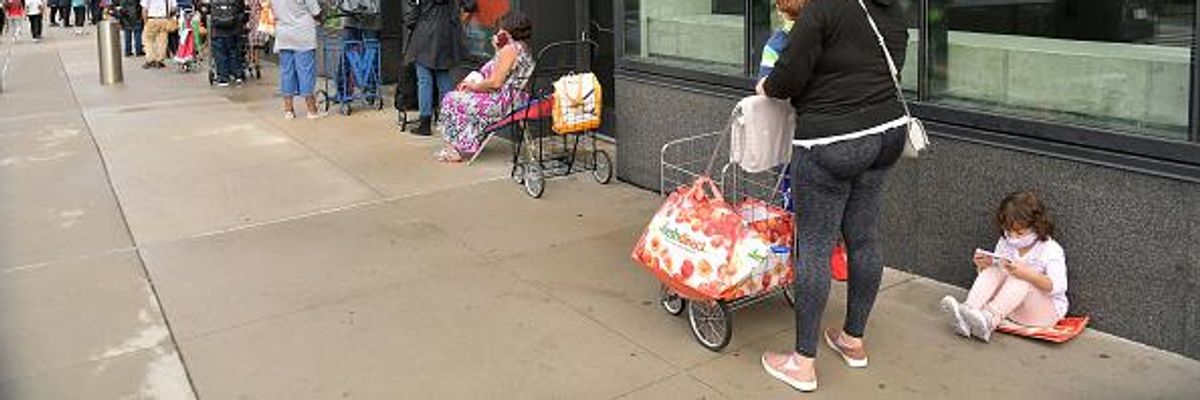
New Yorkers in need line up to receive free produce during a Pop-Up Food pantry event hosted by Food Bank For New York City at Barclays Center on September 10, 2020 in New York City. (Photo: Michael Loccisano/Getty Images for Food Bank For New York City)
Survey Shows Nearly Half in US Suffering Serious Economic Hardship--and Situation 'Going to Get Worse'
"There is nothing for the people we surveyed who earn under $100,000 a year to fall back on."
As the United States endures its six month of the coronavirus pandemic, a new poll finds that nearly half the households in the country report facing major economic pain during the ongoing crisis.
"This is much, much, much worse than I would've predicted."
--Robert J. Blendon, executive director, Harvard Opinion Research Program
The findings were revealed as the number of confirmed Covid-19 cases in the U.S. approached 6.4 million and the nation's death toll topped 190,000, according to John Hopkins University's global tracker.
The polling was conducted by NPR, the Robert Wood Johnson Foundation, and the Harvard T.H. Chan School of Public Health from July 1 to August 3 to investigate financial and health challenges confronting households across America prior to the expiration of federal support programs, suggesting that the results are likely understated.
According to the survey results, 46% of U.S. households nationwide have experienced substantial material hardship during the disease outbreak. For households with incomes under $100,000, that figure increases to 54%, compared to 20% of those with incomes over $100,000, NPR reported.
An accompanying report (pdf)--the first in a series of five planned for publication--details the impact of coronavirus on households in New York, Los Angeles, Chicago, and Houston, the four largest U.S. cities. Researchers asked respondents about their household's experiences with finances, employment, healthcare, housing, transportation, child care, and well-being.
Results from the survey show the actions taken by federal and state governments since March have been inadequate insofar as they failed to protect a significant share of households in major U.S. cities from economic hardship.
"This is what I would expect without a national emergency relief bill," Robert J. Blendon, co-director of the Harvard polling team, told NPR. "We had a $2 trillion relief bill to lift people up and put a pillow under them. But it is not helping nearly as many people as we had expected."
According to the report, half or more of households in the four largest U.S. cities report "facing serious financial problems during the coronavirus outbreak, with issues ranging from depleting their savings to serious problems paying rent."




In all four cities, a majority of households with children reported experiencing caregiving challenges, which include "keeping children's education going, finding childcare while working, finding space for children to get physical activity while maintaining a safe distance from others, and internet connectivity issues."

Mary Gorski Findling, a member of the Harvard polling team, told NPR: "It's not just that these households are struggling to keep their kids' education going--they are also struggling with almost every other aspect of managing their children's lives."
A substantial portion of households in all four cities reported dealing with "negative health consequences as a result" of being "unable to get medical care for serious problems when they needed it."
According to NPR, "a lot of people facing multiple health and financial problems have been turning to the Legal Aid Foundation of Los Angeles"--a nonprofit that provides assistance to low-income families on a variety of issues--in recent months.
Ronette Ramos, an attorney at the organization, told reporters: "There is a minimum of at least three issues per phone call, whether it is housing insecurities... because of their loss of job, or they're dealing with food insecurity." And that is "magnifying health conditions... leading to higher anxiety and blood pressure among clients," she explained.
In all four metropolitan areas, material hardship is concentrated among African-American and Latino households, which are often nearly twice as likely as white households to have suffered from the problems researchers studied.
Yet, while racial disparities in economic insecurity are apparent, evidence from the nation's largest cities indicates that income is an even greater predictor of financial pain, with households earning under $30,000 per year roughly three to four times as likely as those earning over $100,000 annually to have experienced material hardship during the pandemic.
Unsurprisingly, problems are also more acute for households that have endured job and/or wage losses during the pandemic.

Millions of people--majorities of residents living in the four largest U.S. cities--were already broke by the beginning of August just when federal support programs were expiring. "This is much, much, much worse than I would've predicted," said Blendon.
"It's going to get worse," Blendon added. "Because there is nothing for the people we surveyed who earn under $100,000 a year to fall back on."
An Urgent Message From Our Co-Founder
Dear Common Dreams reader, The U.S. is on a fast track to authoritarianism like nothing I've ever seen. Meanwhile, corporate news outlets are utterly capitulating to Trump, twisting their coverage to avoid drawing his ire while lining up to stuff cash in his pockets. That's why I believe that Common Dreams is doing the best and most consequential reporting that we've ever done. Our small but mighty team is a progressive reporting powerhouse, covering the news every day that the corporate media never will. Our mission has always been simple: To inform. To inspire. And to ignite change for the common good. Now here's the key piece that I want all our readers to understand: None of this would be possible without your financial support. That's not just some fundraising cliche. It's the absolute and literal truth. We don't accept corporate advertising and never will. We don't have a paywall because we don't think people should be blocked from critical news based on their ability to pay. Everything we do is funded by the donations of readers like you. Will you donate now to help power the nonprofit, independent reporting of Common Dreams? Thank you for being a vital member of our community. Together, we can keep independent journalism alive when it’s needed most. - Craig Brown, Co-founder |
As the United States endures its six month of the coronavirus pandemic, a new poll finds that nearly half the households in the country report facing major economic pain during the ongoing crisis.
"This is much, much, much worse than I would've predicted."
--Robert J. Blendon, executive director, Harvard Opinion Research Program
The findings were revealed as the number of confirmed Covid-19 cases in the U.S. approached 6.4 million and the nation's death toll topped 190,000, according to John Hopkins University's global tracker.
The polling was conducted by NPR, the Robert Wood Johnson Foundation, and the Harvard T.H. Chan School of Public Health from July 1 to August 3 to investigate financial and health challenges confronting households across America prior to the expiration of federal support programs, suggesting that the results are likely understated.
According to the survey results, 46% of U.S. households nationwide have experienced substantial material hardship during the disease outbreak. For households with incomes under $100,000, that figure increases to 54%, compared to 20% of those with incomes over $100,000, NPR reported.
An accompanying report (pdf)--the first in a series of five planned for publication--details the impact of coronavirus on households in New York, Los Angeles, Chicago, and Houston, the four largest U.S. cities. Researchers asked respondents about their household's experiences with finances, employment, healthcare, housing, transportation, child care, and well-being.
Results from the survey show the actions taken by federal and state governments since March have been inadequate insofar as they failed to protect a significant share of households in major U.S. cities from economic hardship.
"This is what I would expect without a national emergency relief bill," Robert J. Blendon, co-director of the Harvard polling team, told NPR. "We had a $2 trillion relief bill to lift people up and put a pillow under them. But it is not helping nearly as many people as we had expected."
According to the report, half or more of households in the four largest U.S. cities report "facing serious financial problems during the coronavirus outbreak, with issues ranging from depleting their savings to serious problems paying rent."




In all four cities, a majority of households with children reported experiencing caregiving challenges, which include "keeping children's education going, finding childcare while working, finding space for children to get physical activity while maintaining a safe distance from others, and internet connectivity issues."

Mary Gorski Findling, a member of the Harvard polling team, told NPR: "It's not just that these households are struggling to keep their kids' education going--they are also struggling with almost every other aspect of managing their children's lives."
A substantial portion of households in all four cities reported dealing with "negative health consequences as a result" of being "unable to get medical care for serious problems when they needed it."
According to NPR, "a lot of people facing multiple health and financial problems have been turning to the Legal Aid Foundation of Los Angeles"--a nonprofit that provides assistance to low-income families on a variety of issues--in recent months.
Ronette Ramos, an attorney at the organization, told reporters: "There is a minimum of at least three issues per phone call, whether it is housing insecurities... because of their loss of job, or they're dealing with food insecurity." And that is "magnifying health conditions... leading to higher anxiety and blood pressure among clients," she explained.
In all four metropolitan areas, material hardship is concentrated among African-American and Latino households, which are often nearly twice as likely as white households to have suffered from the problems researchers studied.
Yet, while racial disparities in economic insecurity are apparent, evidence from the nation's largest cities indicates that income is an even greater predictor of financial pain, with households earning under $30,000 per year roughly three to four times as likely as those earning over $100,000 annually to have experienced material hardship during the pandemic.
Unsurprisingly, problems are also more acute for households that have endured job and/or wage losses during the pandemic.

Millions of people--majorities of residents living in the four largest U.S. cities--were already broke by the beginning of August just when federal support programs were expiring. "This is much, much, much worse than I would've predicted," said Blendon.
"It's going to get worse," Blendon added. "Because there is nothing for the people we surveyed who earn under $100,000 a year to fall back on."
As the United States endures its six month of the coronavirus pandemic, a new poll finds that nearly half the households in the country report facing major economic pain during the ongoing crisis.
"This is much, much, much worse than I would've predicted."
--Robert J. Blendon, executive director, Harvard Opinion Research Program
The findings were revealed as the number of confirmed Covid-19 cases in the U.S. approached 6.4 million and the nation's death toll topped 190,000, according to John Hopkins University's global tracker.
The polling was conducted by NPR, the Robert Wood Johnson Foundation, and the Harvard T.H. Chan School of Public Health from July 1 to August 3 to investigate financial and health challenges confronting households across America prior to the expiration of federal support programs, suggesting that the results are likely understated.
According to the survey results, 46% of U.S. households nationwide have experienced substantial material hardship during the disease outbreak. For households with incomes under $100,000, that figure increases to 54%, compared to 20% of those with incomes over $100,000, NPR reported.
An accompanying report (pdf)--the first in a series of five planned for publication--details the impact of coronavirus on households in New York, Los Angeles, Chicago, and Houston, the four largest U.S. cities. Researchers asked respondents about their household's experiences with finances, employment, healthcare, housing, transportation, child care, and well-being.
Results from the survey show the actions taken by federal and state governments since March have been inadequate insofar as they failed to protect a significant share of households in major U.S. cities from economic hardship.
"This is what I would expect without a national emergency relief bill," Robert J. Blendon, co-director of the Harvard polling team, told NPR. "We had a $2 trillion relief bill to lift people up and put a pillow under them. But it is not helping nearly as many people as we had expected."
According to the report, half or more of households in the four largest U.S. cities report "facing serious financial problems during the coronavirus outbreak, with issues ranging from depleting their savings to serious problems paying rent."




In all four cities, a majority of households with children reported experiencing caregiving challenges, which include "keeping children's education going, finding childcare while working, finding space for children to get physical activity while maintaining a safe distance from others, and internet connectivity issues."

Mary Gorski Findling, a member of the Harvard polling team, told NPR: "It's not just that these households are struggling to keep their kids' education going--they are also struggling with almost every other aspect of managing their children's lives."
A substantial portion of households in all four cities reported dealing with "negative health consequences as a result" of being "unable to get medical care for serious problems when they needed it."
According to NPR, "a lot of people facing multiple health and financial problems have been turning to the Legal Aid Foundation of Los Angeles"--a nonprofit that provides assistance to low-income families on a variety of issues--in recent months.
Ronette Ramos, an attorney at the organization, told reporters: "There is a minimum of at least three issues per phone call, whether it is housing insecurities... because of their loss of job, or they're dealing with food insecurity." And that is "magnifying health conditions... leading to higher anxiety and blood pressure among clients," she explained.
In all four metropolitan areas, material hardship is concentrated among African-American and Latino households, which are often nearly twice as likely as white households to have suffered from the problems researchers studied.
Yet, while racial disparities in economic insecurity are apparent, evidence from the nation's largest cities indicates that income is an even greater predictor of financial pain, with households earning under $30,000 per year roughly three to four times as likely as those earning over $100,000 annually to have experienced material hardship during the pandemic.
Unsurprisingly, problems are also more acute for households that have endured job and/or wage losses during the pandemic.

Millions of people--majorities of residents living in the four largest U.S. cities--were already broke by the beginning of August just when federal support programs were expiring. "This is much, much, much worse than I would've predicted," said Blendon.
"It's going to get worse," Blendon added. "Because there is nothing for the people we surveyed who earn under $100,000 a year to fall back on."

